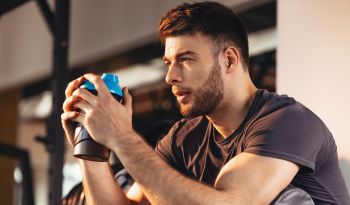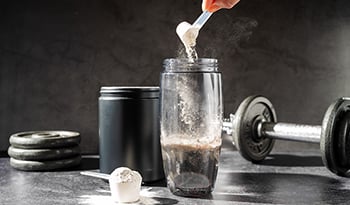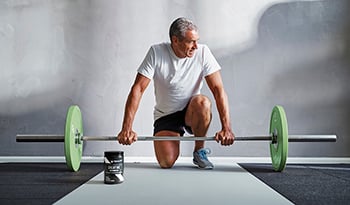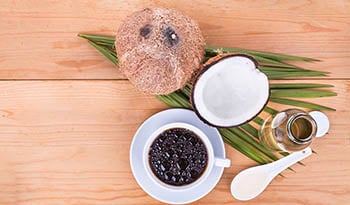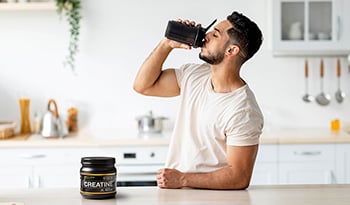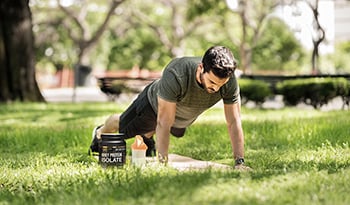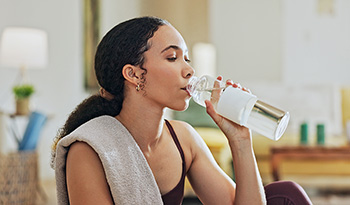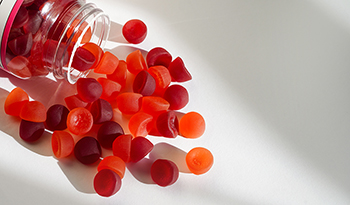6 alimenti e integratori per aiutare in modo naturale i muscoli doloranti

Se ami la palestra e un buon allenamento , allora è molto probabile che tu sia abituato a soffrire di dolori muscolari ogni tanto. , è molto probabile che tu sia abituato ad avere i muscoli doloranti di tanto in tanto. Molti pensano che i muscoli indolenziti siano una ricompensa o un segno di un buon allenamento. Possono esserlo, ma possono anche essere controproducenti.
Quando facciamo esercizio fisico, sottoponiamo i nostri muscoli scheletrici a uno stress che provoca microstrappi in tutte le fibre muscolari. Questi strappi vengono poi ricostruiti nel periodo successivo all'allenamento a un ritmo che’dipende dalla quantità di stress a cui sono sottoposti. Questo è un segno che il corpo si sta ricostruendo, diventando più forte e crescendo. Quindi come può essere controproducente?
Arriva l'indolenzimento muscolare a insorgenza ritardata, o DOMS. Si tratta di un fenomeno che si verifica dopo l'allenamento, ma non sempre subito dopo. A volte i DOMS possono colpire giorni dopo un allenamento e possono causare un discreto dolore o fastidio muscolare . Ed è qui che essere arrabbiati può essere controproducente. I DOMS possono causare una diminuzione della forza, dell'ampiezza di movimento e della voglia di muoversi.
Esistono diversi alimenti e integratori che aiutano ad alleviare e a trattare i muscoli doloranti. Vediamo quali sono e come funzionano alcuni di essi.
Vitamine B e C
Esistono alcune vitamine che possono favorire il recupero muscolare, tra cui le vitamine B e C. Si tratta di vitamine idrosolubili che svolgono entrambe un ruolo nella riduzione dell'indolenzimento muscolare. Dopo l'esercizio fisico, si dice che la vitamina C promuova il recupero grazie alle sue proprietà di riparazione dei tessuti e alla riduzione dello stress ossidativo dell'organismo. Le vitamine del gruppo B hanno diverse funzioni, ma la vitamina B6 , in particolare, migliora la capacità del nostro organismo’di sintetizzare nutrienti e aminoacidi. Questo può essere utile quando il nostro corpo ha bisogno di scomporre composti come le proteine e altri alimenti per ottenere carburante. , e altri alimenti per ottenere carburante.
Curcuma
La curcuma è una spezia naturale che appartiene alla famiglia dello zenzero ed è originaria del sud-est asiatico. Sotto forma di integratore, molti usano la curcuma per le sue proprietà antiossidanti e antinfiammatorie, oltre che per il supporto alle articolazioni e ai muscoli. All'interno della curcuma si trova la curcumina, uno dei componenti principali della radice di curcuma che svolge un ruolo nelle sue capacità antiossidanti.
Alcune ricerche hanno suggerito che la curcuma e la curcumina possono essere efficaci per alleviare l'indolenzimento muscolare a insorgenza ritardata e l'infiammazione articolare . . Uno studio del 2015 ha preso in considerazione 17 uomini e ha analizzato l'impatto dell'integrazione di curcumina sul dolore associato all'indolenzimento muscolare e sulle prestazioni atletiche. I ricercatori hanno fatto integrare la curcumina agli uomini 2 giorni prima di un allenamento stressante per le gambe e fino a 3 giorni dopo l'allenamento.
A 24 e 48 ore dall'allenamento, i ricercatori hanno testato le prestazioni degli uomini nel salto su una gamba sola e hanno somministrato loro un questionario per valutare i livelli di dolore. Hanno scoperto che coloro che hanno assunto la curcumina hanno ottenuto risultati leggermente migliori nel test di salto e hanno avuto meno dolore associato all'indolenzimento muscolare.
Caffeina
La caffeina è utilizzata come stimolante ee, in palestra, per migliorare le prestazioni. Questo integratore stimola il sistema neurale dell'organismo, che a sua volta produce molteplici reazioni nel corpo. Uno dei tanti effetti della caffeina sull'organismo è la sua capacità di contribuire ad alleviare i DOMS. Uno studio del 2013 ha suggerito che il consumo di caffeina prima di un allenamento migliora le prestazioni, ma riduce anche l'indolenzimento muscolare e il dolore associato ai DOMS post-allenamento.
Disclaimer: il consumo di caffeina deve essere usato con moderazione e si consiglia sempre di consultare un medico prima di farlo regolarmente.
Cannella
La cannella è un'altra spezia naturale che’viene spesso utilizzata per il suo sapore, l'influenza sulla sensibilità all'insulina e l'attività antiossidante . Una delle tante caratteristiche positive dell'attività antiossidante della cannella’nell'organismo è l'aiuto che può dare in caso di indolenzimento muscolare. Ad esempio, uno studio del 2013 ha analizzato la relazione tra l'integrazione di 3 g (meno di un cucchiaino) di zenzero, cannella e un placebo sull'indolenzimento muscolare in sei donne sane. I ricercatori hanno scoperto che la cannella ha aiutato l'indolenzimento muscolare meglio dei gruppi zenzero e placebo.
Succo di ciliegia
Il succo di ciliegia è un altro rimedio naturale per l'indolenzimento e il dolore muscolare. Le ciliegie crostate sono utilizzate per i loro alti livelli di antiossidanti e composti antinfiammatori , che possono aiutare a contrastare le infiammazioni muscolari che possono derivare da allenamenti stressanti.
Una ricerca del 2010 ha preso in esame 54 corridori sani (36 maschi e 18 femmine) che hanno corso per circa 26 chilometri in un periodo di 24 ore e ha evidenziato come il succo di ciliegia possa aver avuto un ruolo nel dolore muscolare post-corsa. Gli autori dello studio hanno fatto assumere ai soggetti 355 ml (circa 1,5 tazze) due volte al giorno per sette giorni prima della corsa e il giorno stesso della corsa. Hanno poi chiesto ai soggetti di valutare il dolore muscolare prima, durante e dopo la gara. Dopo aver indagato, i ricercatori hanno scoperto che coloro che hanno utilizzato il succo di ciliegia avevano meno dolore rispetto a coloro che hanno utilizzato il placebo.
L'indolenzimento muscolare può essere il risultato di un allenamento e di uno stile di vita sano, ma un indolenzimento eccessivo può essere controproducente per la salute generale. Se ti accorgi di essere eccessivamente indolenzito, prova uno di questi integratori: potrebbero essere un modo utile per alleviare i DOMS e favorire la velocità di recupero.
Bibliografia:
- https://www.ncbi.nlm.nih.gov/pubmed/25795285
- https://www.ncbi.nlm.nih.gov/pubmed/24164961
- https://www.ncbi.nlm.nih.gov/pubmed/23717759
- https://www.ncbi.nlm.nih.gov/pmc/articles/PMC2874510
ESONERO DI RESPONSABILITÀ:Questo Centro Benessere non intende fornire diagnosi...

















































































 Indice
Indice




